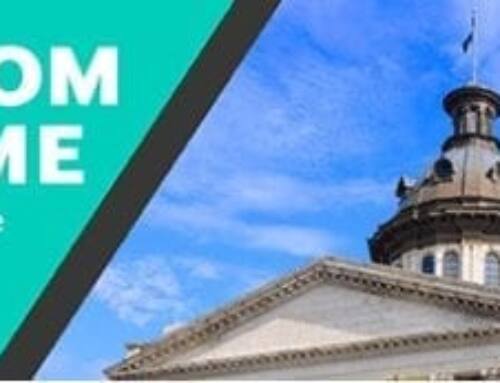Friday, Sept. 18, 2020
The General Assembly returned to Columbia to begin a special two-week legislative session.
The Senate passed its version of the FY20-21 state budget and authorization for the remaining CARES Act funds. The House amended the Senate CARES Act authorization and did not take up the state budget. They will return next week to complete the 2020 legislative session.
accelerateSC is a one-stop website to help businesses and citizens connect to important information during this crisis.
BUDGET
By a vote of 40-3, the Senate adopted a strike and insert amendment to H.5201, the General Appropriations Act, on Tuesday. The House had previously passed its version of the state budget in February. While it was noted that leadership in the House of Representatives preferred to continue operating under the Continuing Resolution H.3411 that provides for the continued and uninterrupted operation of state government for the current fiscal year, Senate Finance Subcommittee Chairman Thomas Alexander (R-Oconee) said he felt it was the duty of the Senate to pass an appropriations bill.
Of the $86 million estimated recurring revenue, the bill appropriates $50 million to the Education Finance Act (EFA), which can be used for teacher salary increases. It also provides $11.7 million to the Local Government Fund. The balance of the estimated revenue, $24 million, would go unspent and into a residual recurring fund.
Of the $775 million estimated one-time surplus, the bill would set aside $500 million to a midyear shortfall reserve fund to prevent state agency budget cuts in the event of an economic downturn. The bill also provides one-time funding that includes:
- $70 million to the COVID-19 Reserve Account
- $50 million – Department of Corrections
- $34 million – Charter Schools
- $20 million – Essential state employee hazard bonus pay ($1,000 each, earning under $50,000);
- $6 million – School nurses
- $40 million – Parks, Recreation and Tourism advertising
- $17 million – Department of Mental Health – Veterans Nursing Home construction
- $5 million – ReadySC – workforce training
- $4.1 million – Elections Commission – poll workers
- $28 million – Residual non-recurring account
House leadership has indicated they will not take up the budget when they return next week. Should the General Assembly adjourn next week without passage of the state budget, state government will continue operating under the terms of the Continuing Resolution.
CARES ACT AUTHORIZATION
The Senate approved H.3210 Phase II authorization of the remaining $668 million from the federal CARES Act on Tuesday. The next day, the House amended the bill with their recommendations. Both chambers recommend authorizing:
- $420 million – Unemployment Insurance Trust Fund
- $73 million – DHEC statewide testing and monitoring
- $20 million – MUSC statewide testing
Differences remain in the amount of funds authorized for local governments and colleges mitigation; Grant program for nonprofits (food, rent, housing, utilities, mental health grants from $2,500-$50,000); and the Minority Relief Grant Program funding.
The bill will now go to a Conference Committee made up of three members of each body to resolve the differing versions. The House has appointed Representatives Murrell Smith (R-Sumter), Kirkman Finlay (R-Richland) and Bill Clyburn (D-Aiken) to serve on the conference committee. The Senate conferees are Senators Thomas Alexander (R-Oconee), Vincent Sheheen (D-Kershaw) and Tom Davis (R-Beaufort).
TAX
By a vote of 63-0, the House favorably approved S.545 (Senator Alexander) on Wednesday relating to assessing property of businesses and other entities. The bill relates to business personal property and requires filing through the Department of Revenue (DOR). The bill, which passed the Senate in March, requires all counties to use the DOR approved PT-100 form for filing business personal property assessments. The bill was amended on the floor to forgive and exclude gross income from the federal paycheck protection program for federal and state income tax purposes.
Further, to the extent the federal government allows the deduction of expenses associated with the forgiven paycheck protection program (PPP) loans, these expenses will be allowed as a deduction for South Carolina income tax purposes. The bill now goes back to the Senate for concurrence.
GENERAL BUSINESS
Legislation relating to business license tax standardization H.4431 (Reps. Jordan, Fry, Rose, Forrest and others) remains on the Senate calendar after several senators objected to the bill this week. The bill, a high priority for the business community, has been under discussion for several years by numerous stakeholders and seemed poised to finally become law until objections were raised this week regarding certain prohibitions for third-party vendors under contract with smaller municipalities.
The bill remains on the Senate calendar and will see its last chance for passage this session next week.
CORONAVIRUS
To view all of the governor’s previous Executive Orders, click here.
For more information from SC DHEC on the virus, click here.
The DHEC Care Line is available to provide general information about COVID-19 by calling 1-855-472-3432 from 8 a.m.-6 p.m., seven days a week.
COVID-19 Screening & Testing Sites
Other helpful links:
The Emergency Management Division provides links to important information, including the SC Department on Aging, SC Childcare, the SC Department of Employment and Workforce, the Department of Revenue and the SC Department of Insurance.
South Carolina Department of Commerce for small business information and assistance.
For additional resources that may be beneficial to your organization’s recovery efforts, visit Haynsworth Sinkler Boyd’s COVID-19 Resources page (Copper Dome Strategies is a subsidiary of HSB).
South Carolina Health Alert Network
South Carolina COVID-19 Emergency Supply Sourcing & Manufacturing
HEALTHCARE
The Senate gave second reading approval to H.4663 (Reps. Finlay and Wheeler) by a vote of 40-1 on Wednesday. The bill would allow pharmacists to administer influenza vaccines to persons of any age without the order of a practitioner pursuant to protocols of the Board of Medical Examiners. By unanimous consent, the bill received third reading Thursday and now goes to the governor.
Also on Wednesday, the Senate approved H.4938 (Rep. Ridgeway), which adds certain exceptions to electronic prescribing requirements. That bill also received third reading Thursday and was returned to the House for concurrence in Senate amendments.
ELECTION REFORM
The House adopted Senate amendments to H.5305 on Tuesday that would expand absentee voting eligibility to everyone because of the COVID-19 pandemic. Anyone voting by absentee ballot would have to go into an election office to turn in their ballot under the bill. A similar bill was signed into law for the recent June primaries. Gov. Henry McMaster signed the bill into law Wednesday. For more information on voting in the November elections, click here.
ENERGY
The Senate approved H.4940 (Reps. Sandifer and Forrester) by a vote of 41-0 on Wednesday. This Joint Resolution establishes the Electricity Market Reform Measures Study Committee. The committee would study redesigning rate structures and alternative energy plans. The bill received third reading Thursday. This joint resolution takes effect upon approval by the Governor and is contingent upon appropriations by the General Assembly.
RETIRING MEMBERS
Numerous House members took to the podium this week to give farewell addresses to their colleagues:
- Jimmy Bales – District 80 – Eastover
- Robert Brown – District 106 – Hollywood
- Converse Chellis – District 94 – Summerville
- Gary Clary – District 3 – Pickens
- Alan Clemmons – District 107 – Myrtle Beach
- Mike Forrester – District 34 – Spartanburg
- Nancy Mace – District 99 – Charleston
- David Mack – District 109 – N. Charleston
- Peter McCoy – District 115 – Charleston
- Robert Ridgeway – District 64 – Manning
- Mike Sottile – District 112 – Isle of Palms
- Kit Spires – District 96 – Pelion
- Eddie Tallon – District 33 – Spartanburg
- Mac Toole – District 88 – West Columbia
Two Senators will not be returning next year: Sen. John Matthews, District 39 – Orangeburg and Sen. Greg Gregory, District 16 – Lancaster.
SINE DIE RESOLUTION
The General Assembly adopted a Sine Die Resolution, S.1194, which allows them to continue past the mandatory May 14 Sine Die deadline to complete unfinished business.
Each House will stand adjourned to meet at the call of the President Pro Tem of the Senate and the Speaker of the House of Representatives. The resolution further authorizes the General Assembly to meet again in statewide session on Tuesday, Sept. 15, at noon and continue in statewide session until Sept. 24 for the consideration of specific matters, including the annual General Appropriations Act.
Unless the session is otherwise adjourned Sine Die at an earlier date, the 2020 session of the General Assembly shall stand adjourned Sine Die not later than 11:59 p.m. on Sunday, Nov. 8, 2020.
UP NEXT
The General Assembly returns again next Tuesday to complete the Special Session.
REARVIEWS 2020
Thank you for following SCACPA’s ‘The View from the Dome’ for State House Developments on Tax Issues Through SC’s 2020 Legislative Session. Here is a review of our weekly updates.
Jan. 10: South Carolina’s Pending Tax Bills and Your 2020 Legislative Preview
Jan. 17: Gov. McMaster’s Executive Budget Calls for Tax Cuts, Rebates for Taxpayers
Jan. 31: House Subcommittee Hears Budget Request from SC Chief Justice to Improve Case Management System
Feb. 7: Senate Finance Committee Approves Business Personal Property Bill for DOR Filing
Feb. 14: Board of Economic Advisors Announces Largest Budget Surplus in SC History
Feb. 21: House Floor Debate is Up Next for Budget After Ways and Means Committee Plan Adopted
Feb. 28: House Members Have Upcoming Week to Study Budget Before Floor Debate
March 6: Education Reform Bill Moves from Senate to House; DHEC Tells of Coronavirus Resources
March 20: A Look Inside the $45M COVID-19 Relief Package for DHEC; Return of Legislators is on Hold
March 27: Legislative Session Remains Postponed; Candidate Filing Period Ends on March 30
April 17: McMaster Announces ‘Accelerate South Carolina’ Revitalization Plan, Details to Come
April 24: accelerateSC Revitalization Task Force Goes to Work
May 1: General Assembly Set to Return to State House on May 12
May 8: Gov. McMaster Announces that Indoor Dining in SC Can Resume on May 11
May 29: Gov. McMaster Will Now Review accelerateSC Committee’s Final Recommendations
June 12: Gov. McMaster Recommends Disbursal of $1.9B Coronavirus Relief Fund in Two Phases
June 19: Senate Finance Committee’s Plan for CARES Act Funds Includes $500M for Unemployment Trust Fund
June 26: $1.2B in Federal CARES Act Funding is Authorized
July 10: accelerateED Task Force Offers its Guidance for 2020-21 School Year
July 31: Board of Economic Advisors Anticipates SC’s 2019-20 Surplus as $220M
Aug. 7: Legislative Committees Discuss Regulatory Relief, Broadband Access and Testing Efforts
Aug. 14: Joint Bond Review Committee Approves Highway Projects, Seeks More Funds for Rural Broadband
Aug. 21: Gov. McMaster Urges Cabinet Agencies to Maintain Funding Levels from Continuing Resolution For Now
Aug. 28: Comptroller’s Office Announces $350M Surplus for FY 2019-20
Sept. 4: Latest BEA Projection is $775M in One-Time Surplus Revenue
To keep up with the latest news of SCACPA Advocacy, turn to the SCACPA Blog and our social media outlets.


